

7 Habits of Incredibly Happy People. While happiness is defined by the individual, I’ve always felt it foolish to declare that nothing can be learned from observing the happiness of others.
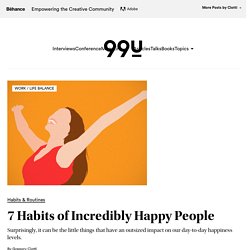
In our day-to-day lives it is easy to miss the forest for the trees and look over some of the smaller, simpler things that can disproportionally affect our happiness levels. Luckily, we can go off more than just our intuition; there are lots of studies that aim for finding the right behavior that leads to a happier life. Below, we take a look at some of the more actionable advice. 1. Be Busy, But Not Rushed Research shows that being “rushed” puts you on the fast track to being miserable.
The porridge is just right when you’re living a productive life at a comfortable pace. Feeling like you’re doing busywork is often the result of saying “Yes” to things you are not absolutely excited about. You should be expanding your comfort zone often, but not so much that you feel overwhelmed. Positive Psychology. Positive Psychology Exercise - Emoclear Self-Helpapedia. Emoclear Positve Psychology Exercise I: Doing Pleasurable, Important, and Meaningful Activities Every day for two weeks do the following: 1.
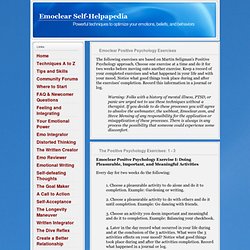
Choose a pleasurable activity to do alone and do it to completion. Example: Gardening or writing.2. A resource for increasing your capacity for happiness through simple exercises. Feature Story: Writing to Heal: Research shows writing about emotional experiences can have tangible health benefits. For nearly 20 years, Dr.

James W. Pennebaker has been giving people an assignment: write down your deepest feelings about an emotional upheaval in your life for 15 or 20 minutes a day for four consecutive days. Many of those who followed his simple instructions have found their immune systems strengthened. Others have seen their grades improved. Sometimes entire lives have changed. Pennebaker, a professor in the Department of Psychology at The University of Texas at Austin and author of several books, including “Opening Up” and “Writing to Heal,” is a pioneer in the study of using expressive writing as a route to healing.
“When people are given the opportunity to write about emotional upheavals, they often experience improved health,” Pennebaker says. In his early research Pennebaker was interested in how people who have powerful secrets are more prone to a variety of health problems. “Emotional upheavals touch every part of our lives,” Pennebaker explains. The Charlotte, N.C. Positive Psychology Exercises. Mental health is the true concern of psychology.
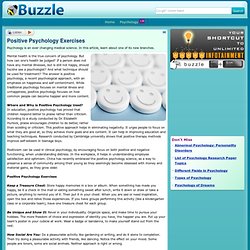
But how can one's health be judged? Positive Psychology Exercises. Rebecca Hardy tries non-medicinal solutions to misery in the happiness workout. Misery: it's everywhere these days.
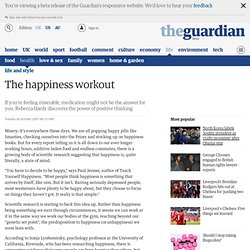
We are all popping happy pills like Smarties, checking ourselves into the Priory and stocking up on happiness books. But for every report telling us it is all down to our ever-longer working hours, additive-laden food and endless commutes, there is a growing body of scientific research suggesting that happiness is, quite literally, a state of mind.
Home. Mindfulness (psychology) Mindfulness as a psychological concept is the focusing of attention and awareness, based on the concept of mindfulness in Buddhist meditation.[1] It has been popularised in the West by Jon Kabat-Zinn.[2] Despite its roots in Buddhism, mindfulness is often taught independently of religion.[3][4] Clinical psychology and psychiatry since the 1970s have developed a number of therapeutic applications based on mindfulness for helping people suffering from a variety of psychological conditions.[5] Several definitions of mindfulness have been used in modern psychology.
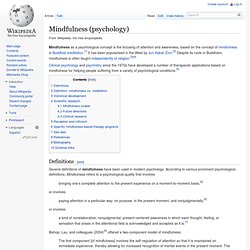
According to various prominent psychological definitions, Mindfulness refers to a psychological quality that involves bringing one’s complete attention to the present experience on a moment-to-moment basis,[6] or involves paying attention in a particular way: on purpose, in the present moment, and nonjudgmentally,[6] Interventions - Positive Psychology at Tufts. Coping via thought disputation is a specific technique derived from cognitive therapy for depression.
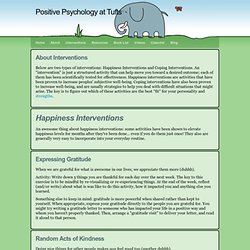
The method urges us to challenge our own pessimistic thoughts. The technique can be done in a variety of ways. It can be done informally in a discussion with someone else, written down, or simply done in your head. The prompts below offer a framework for approaching your problem. 1) Write down nature of the Adversity or problem that you are facing. 2) Identify any negative Beliefs triggered by this problem. 3) Record the Consequences of the problem, how you are feeling or acting as a result. 4) Dispute the negative belief, challenging it, thinking of other possible reasons for the problem. 5) Consider the more optimistic explanations of your problem to Energize you and lift your spirits, so that you become less anxious and more hopeful. To be sure, the hardest part is disputation and to challenge your own negative thoughts.
Here are some additional prompts: Positive psychology interventions. Psychlopedia -- Key concepts -- Concepts associated with wellbeing -- Positive psychology interventions Jump to the comments Section Overview A variety of interventions have been developed to facilitate positive emotions, wellbeing, growth, creativity, relationships, fulfillment, and other desirable consequences (for related interventions, see appreciative inquiry and loving-kindness meditation).
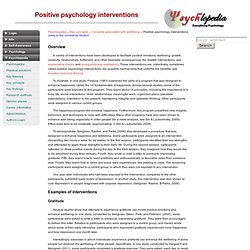
These interventions are, collectively, sometimes called positive psychology interventions (for possible mechanisms that underlie the benefits, see broaden and build theory). To illustrate, in one study, Fordyce (1983) examined the utility of a program that was designed to enhance happiness, called the 14 fundamentals of happiness. Across several studies, some of the participants were exposed to this program.
The happiness program did increase happiness.